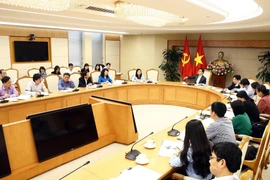Participants discussed children’s rights, childlabour, the protection of children on the Internet, the influence of opinionson social networks and the mass media’s moulding role, the principles ofchildren’s privacy protection for the press, and multi-dimensional approachesin children supporting communications.
Nguyen Thi Nga, Deputy Director of theDepartment of Child Affairs under the Ministry of Labour, Invalids and SocialAffairs (MoLISA), said child protection is the implementation of appropriatemeasures to ensure that children live safely and healthily, the prevention andsettlement of violations against children, and the support for disadvantagedchildren.
However, support for children with disadvantagesin many localities hasn’t received due attention, she noted, calling on pressagencies to boost communications to improve relevant agencies and authorities’awareness and promotion of support for underprivileged children.
Talking about the way press agencies cover childsexual abuse cases, Director of the department Dang Hoa Nam said the pressstill prefers reporting on personal information about both culprits and victimsto attract readers, and they haven’t paid attention to the feelings of victimsand their families.
Nguyen Cong Hieu, Deputy Director of theMoLISA’s Centre for Consultant and Media Services, stressed that reportersshould not neglect victims’ feelings for the sake of a “view” or a “like” sincesometimes, a piece of information they report could “accidentally kill aperson.”
Echoing this, Dr Ho Bat Khuat from the Gia dinhva Tre em (Family and Children) magazine said journalists always need torespect occupational ethnics and give the top priority to children’sinterests.
He also suggested reporters spend time workingin remote areas where there are many children-related issues they can report onand help to deal with.
The workshop was held by the Department of ChildAffairs, the Management and Sustainable Development Institute, theInternational Labour Organisation and the Save the Children International. -VNA





























